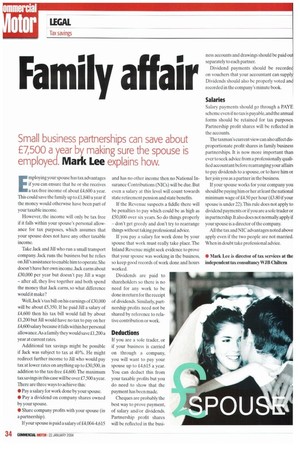Family affair
Page 34

If you've noticed an error in this article please click here to report it so we can fix it.
Small business partnerships can save about E7,500 a year by making sure the spouse is
employed. Mark Lee explains how.
Employing your spouse has tax advantages if you can ensure that he or she receives a tax-free income of about £4,600 a year. This could save the family up to £1,840 a year if the money would otherwise have been part of your taxable income.
However, the income will only be tax free if it falls within your spouse's personal allowance for tax purposes, which assumes that your spouse does not have any other taxable income.
Take Jack and Jill who run a small transport company. Jack runs the business but he relies on Jill's assistance to enable him to operate.She doesn't have her own income.Jack earns about £30,000 per year but doesn't pay Jill a wage after all, they live together and both spend the money that Jack earns, so what difference would it make?
Wel1,1ack's tax bill on his earnings of f_30,000 will be about £5,350. If he paid Jill a salary of £4,600 then his tax bill would fall by about £1200 but Jill would have no tax to pay on her £4,600 salary because it falls within her personal allowance. As a family they would save £1200 a year at current rates.
Additional tax savings might be possible if Jack was subject to tax at 40%. He might redirect further income to Jill who would pay tax at lower rates on anything up to £30,500. in addition to the tax-free £4.600. The maximum tax savings in this case will be over £7.5C0 a year. There are three ways to achieve this: • Pay a salary for work done by your spouse.
• Pay a dividend on company shares owned by your spouse.
• Share company profits with your spouse (in a partnership). If your spouse is paid a salary of £4,004-4,615 and has no other income then no National Insurance Contributions (NICs) will be due. But even a salary at this level will count towards state retirement pension and state benefits.
If the Revenue suspects a fiddle there will be penalties to pay which could be as high as £50,000 over six years. So do things properly don't get greedy and don't try to rearrange things without taking professional advice.
If you pay a salary for work done by your spouse that work must really take place. The Inland Revenue might seek evidence to prove that your spouse was working in the business, so keep good records of work done and hours worked.
Dividends are paid to shareholders so there is no need for any work to be done in return for the receipt of dividends. Similarly, partnership profits need not be shared by reference to relative contribution or work.
Deductions
If you are a sole trader, or if your business is carried on through a company, you will want to pay your spouse up to £4,615 a year. You can deduct this from your taxable profits but you do need to show that the payment has been made.
Cheques are probably the best way to prove payment, of salary and/or dividends. Partnership profit shares will be reflected in the busi ness accounts and drawings should be paid ou separately to each partner.
Dividend payments should be recordec on vouchers that your accountant can supply Dividends should also be properly voted anc recorded in the company's minute book.
Salaries
Salary payments should go through a PAYE scheme even if no tax is payable.and the annual forms should be retained for tax purposes. Partnership profit shares will be reflected in the accounts.
The taxman's current view can also affect disproportionate profit shares in family business partnerships. It is now more important than ever to seek advice from a professionally qualified accountant before rearranging your affairs to pay dividends to a spouse, or to have him or her join you as a partner in the business.
If your spouse works for your company you should be paying him or her at least the national minimum wage of £4.50 per hour (£3.80 if your spouse is under 22). This rule does not apply to dividend payments or if you area sole trader or in partnershipit also does not normally apply if your spouse is a director of the company.
All the tax and NIC advantages noted above apply even if the two people are not married. When in doubt take professional advice.




























































































































































































